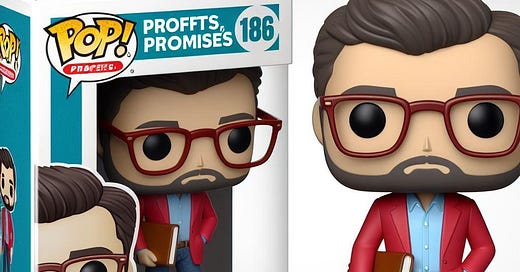Are West End Prices Too High?
Hi!
AI has a use, turning me into a Funko Pop doll!
That amount of hair, I’d rule the world!
The head to body ratio, close. Tough, but fair.
I’m plowing through links, notebooks, and ideas that I’ve been collecting all year.
So: you are welcome or I’m sorry.
But I do like this take on the newsletter and a lot of the stuff I do for free.
To the Tickets!
Friend of the newsletter and podcast, Amy Maiden, posted this on her LinkedIn page.
A few thoughts on this subject:
Discounts don’t stimulate demand. You can’t get people to buy something they don’t have an interest in by just dropping the price.
Don’t believe me, Sean Kelly links to some data on the topic that comes from a study of museums.
Again, you have to get people to want to come to your venue. If they don’t care, no price will get them there.
You can price people out. But discounting doesn’t necessarily make that item seem more attractive. It has the opposite impact, it makes people wonder what is wrong with an item.
Value based pricing, even for theatre, can help smooth out some of the revenue issues.
This is why looking at the average of anything can be misleading. The average West End price last season may have been £54. But that’s across 16.4M tickets. That number doesn’t tell us a lot.
What’s the median number?
Ultimately, this is about strategy.
A commercial producer doesn’t necessarily have the fiduciary responsibility of growing a love of the theatre or the arts because they have to keep an eye on making sure that their production can stay afloat.
Which turns this around to a different consideration?
What is the role of the arts in a society?
If sustainability and audience development are a concern, how can we create opportunities, incentives, and programs that will encourage these behaviors?
Do people have the same appreciation or put the same value on the arts as they did?
If not, why?
If so, let’s look at why or how they are experiencing things.
What’s your take?
Let me know by hitting reply or jumping into the chat on the ‘Talking Tickets’ Slack Channel.
While we are on this topic:
Holly Mulcahy asks where Ryan Reynolds is and can he help non-profits classical music organizations?
Spoiler: I don’t necessarily feel you need a huge marketing budget to do effective marketing campaign. You might need a big budget to do a big advertising campaign though.
Ruth Hartt flips this to point out all ways that an arts organization can become more customer centric.
Listen to her podcast episode on ‘Jobs to Be Done’. She’s a G!
Mike Guiffre and Troy Kirby teach us the value of A + B > 2A or 2B:
Mike has done tremendous work in St. Louis with the XFL. They’ve sold tremendous amounts of tickets predominately online.
Troy has been ahead of the curve on many things including the stupidity of discounts and comping tickets to “get people in the door so they will come back and pay full price later.”
This is worth your time because the trends have been evident for a long time.
The big thing is that you need to combine media: A + B > 2A or 2B.
Brand building and sales activation go hand in hand.
Barcelona’s travels across the Atlantic twice in 32 hours to earn $5M:
Almost $1B in debt, short-term decision making…stop me if you know how this ends.
Not well.
The first rule of digging yourself out of a hole, stop digging.
Nick Meacham nailed it with his Premier League rights’ prediction:
Experts make predictions. 4% growth in the new media deal isn’t shabby, but isn’t what people were expecting either.
We’ve taught people that it is rewarding to wait:
The flip side of putting off pleasure is also that people are being rewarded to wait.
It used to be the punishment of not buying a ticket early was overwhelming the desire to wait.
Remember, D2C is a scale business:
INTIX asks what box office folks would like to see change about “ticketing”?
I’m always asking for people to be more strategic and think more holistically.
What about you?
This framework for differentiation can be useful:
Let me try it out:
Most of the industry analysis is banal and reductive, ‘Talking Tickets’ is acerbic, snarky, and smart!
A tough year for e-Sports franchises?
This is all about value.
Chasing a “young” audience might not make the most sense for long-term stability.
You need to look at the behaviors and angle towards them as opposed to chasing what is “hot”.
This is true of any industry.
Fads come and go.
What is going to be consistent over time?
Visit my website: www.DaveWakeman.com




